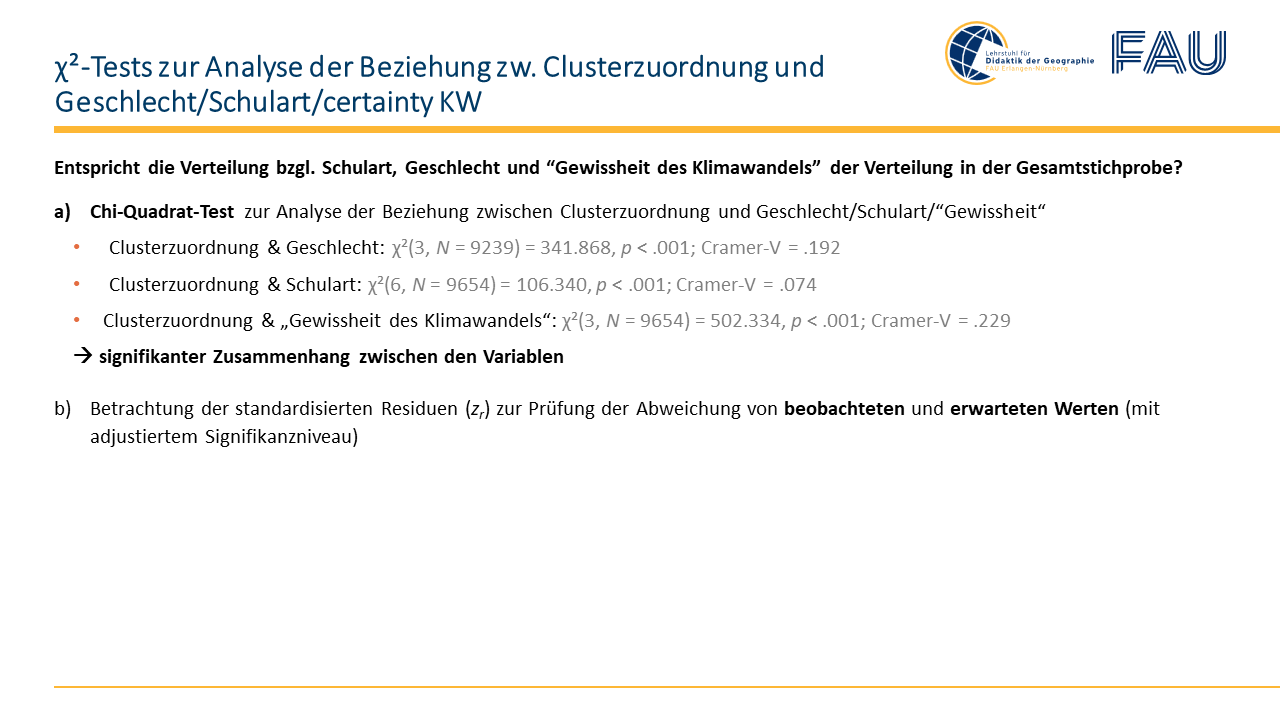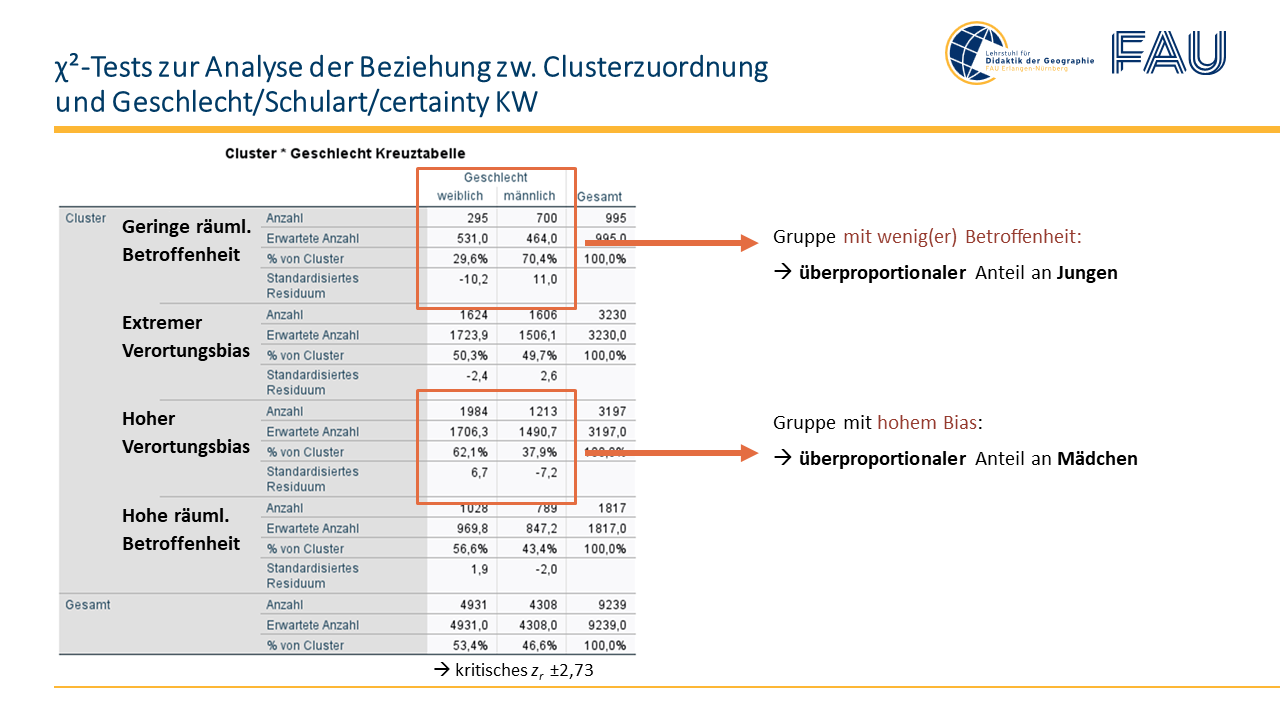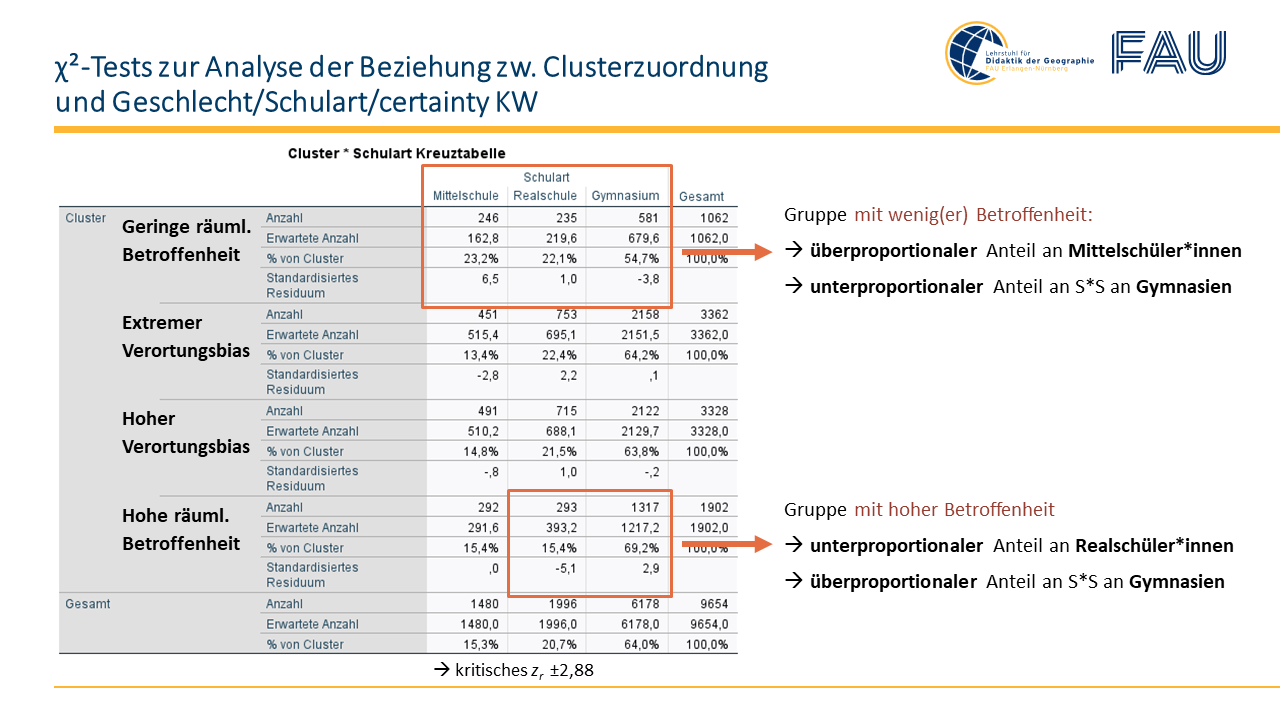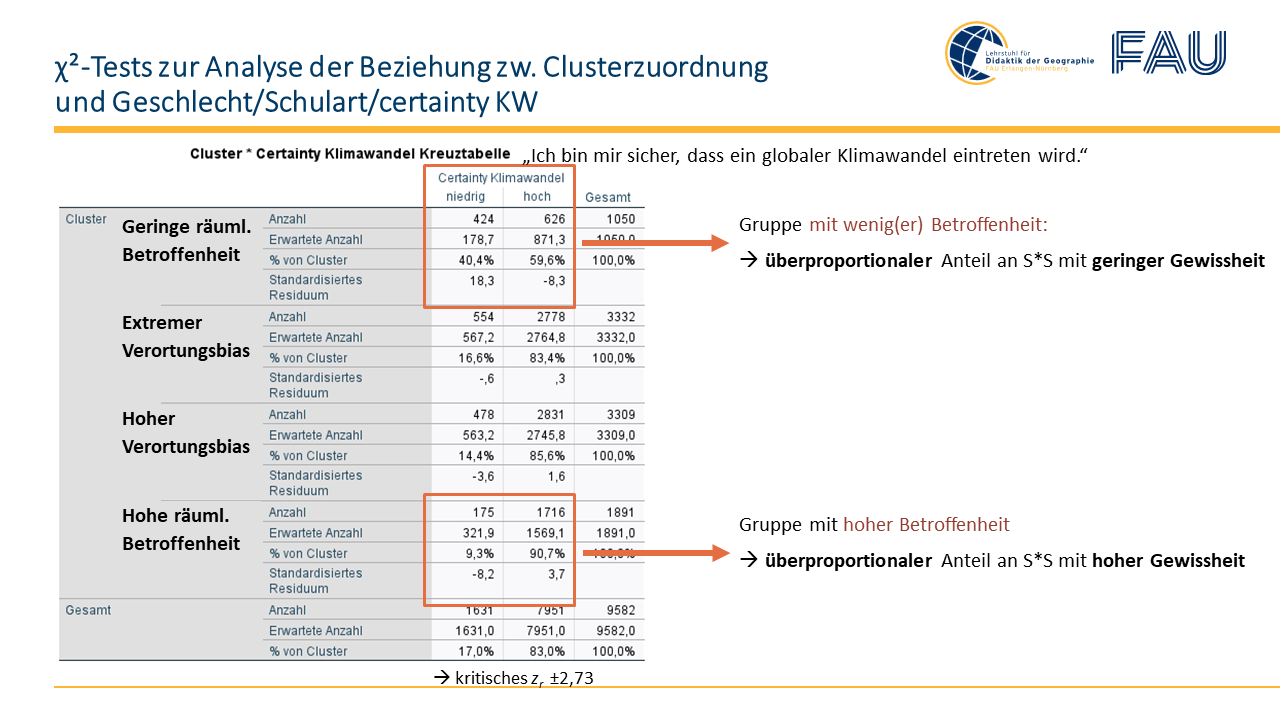Literaturverzeichnis: Die wahrgenommene räumliche Betroffenheit durch den Klimawandel bei Schüler:innen – vom „Fernraumthema“-Phänomen zu spezifischen Wahrnehmungsclustern
Bashir, N. Y., Wilson, A. E., Lockwood, P., Chasteen, A. L., & Alisat, S. (2014). The Time for Action is Now: Subjective Temporal Proximity Enhances Pursuit of Remote-Future Goals. Social Cognition, 32(1), 83–93. https://doi.org/10.1521/soco.2014.32.1.83
Brügger, A., Morton, T. A., & Dessai, S. (2016). “Proximising” climate change reconsidered: A construal level theory perspective. Journal of Environmental Psychology, 46, 125–142. https://doi.org/10.1016/j.jenvp.2016.04.004
Cohen, J. (2013). Statistical Power Analysis for the Behavioral Sciences (0 Aufl.). Routledge. https://doi.org/10.4324/9780203771587
Coquet, M., Mercier, D., & Fleury-Bahi, G. (2019). Assessment of the exposure to coastal flood risk by inhabitants of French coasts: The effect of spatial optimism and temporal pessimism. Ocean & Coastal Management, 177, 139–147. https://doi.org/10.1016/j.ocecoaman.2019.05.004
CRED (Center for Research on Environmental Decisions) (2009). The Psychology of Climate Change Communication: A Guide for Scientists, Journalists, Educators, Political Aides, and the Interested Public. New York.
Cunsolo, A., Harper, S. L., Minor, K., Hayes, K., Williams, K. G., & Howard, C. (2020). Ecological grief and anxiety: The start of a healthy response to climate change? The Lancet Planetary Health, 4(7), e261–e263. https://doi.org/10.1016/S2542-5196(20)30144-3
Dohm, L., Peter, F., & Rodenstein, B. (2020). Wenn Warnungen ungehört verhallen. Psychische Prozesse im Umgang mit der Klimakrise.
Döring, N., & Bortz, J. (with Pöschl-Günther, S.). (2016). Forschungsmethoden und Evaluation in den Sozial- und Humanwissenschaften (5. vollständig überarbeitete, aktualisierte und erweiterte Auflage). Springer. https://doi.org/10.1007/978-3-642-41089-5
Duan, R., Takahashi, B., & Zwickle, A. (2019). Abstract or concrete? The effect of climate change images on people’s estimation of egocentric psychological distance. Public Understanding of Science, 28(7), 828–844. https://doi.org/10.1177/0963662519865982
Fiene, C. (2014). Wahrnehmung von Risiken aus dem globalen Klimawandel – eine empirische Untersuchung in der Sekundarstufe I [PhD Thesis]. https://nbnresolving.org/urn:nbn:de:bsz:he76-opus-75437: aufgerufen am 18.06.2024.
Fleury-Bahi, G. (2008). Environmental Risk: Perception and Target with Local versus Global Evaluation. Psychological Reports, 102(1), 185–193. https://doi.org/10.2466/pr0.102.1.185-193
Gifford, R., Scannell, L., Kormos, C., Smolova, L., Biel, A., Boncu, S., Corral, V., Güntherf, H., Hanyu, K., Hine, D., Kaiser, F. G., Korpela, K., Lima, L. M., Mertig, A. G., Mira, R. G., Moser, G., Passafaro, P., Pinheiro, J. Q., Saini, S., … Uzzell, D. (2009). Temporal pessimism and spatial optimism in environmental assessments: An 18-nation study. Journal of Environmental Psychology, 29(1), 1–12. https://doi.org/10.1016/j.jenvp.2008.06.001
Gubler, M., Brügger, A., & Eyer, M. (2019). Adolescents’ Perceptions of the Psychological Distance to Climate Change, Its Relevance for Building Concern About It, and the Potential for Education. In W. Leal Filho & S. L. Hemstock (Hrsg.), Climate Change and the Role of Education (S. 129–147). Springer International Publishing. https://doi.org/10.1007/978-3-030-32898-6_8
Guillard, M., Fleury-Bahi, G., & Navarro, O. (2021). Encouraging Individuals to Adapt to Climate Change: Relations between Coping Strategies and Psychological Distance. Sustainability, 13(2), 992. https://doi.org/10.3390/su13020992
Hatfield, J., & Soames Job, R. F. (2001). Optimism bias about environmental degradation: The role of the range of impact of precautions. Journal of Environmental Psychology, 21(1), 17–30. https://doi.org/10.1006/jevp.2000.0190
Hess, D. J., & Maki, A. (2019). Climate change belief, sustainability education, and political values: Assessing the need for higher-education curriculum reform. Journal of Cleaner Production, 228, 1157–1166. https://doi.org/10.1016/j.jclepro.2019.04.291
Höhnle, S., Velling, H., & Schubert, J. C. (2023). Das Interesse von Schülerinnen und Schülern am Klimawandel. Zeitschrift für Geographiedidaktik (ZGD), 70-85 Seiten. https://doi.org/10.60511/51192
Höhnle, S., Velling, H., & Schubert, J. C. (2024). Klimawandelangst bei Schülerinnen und Schülern der Sekundarstufe. Zeitschrift für Geographiedidaktik (ZGD), 52(Zeitschrift für Geographiedidaktik (ZGD), Bd. 52 (2024)), 104–118. https://doi.org/10.60511/52483
Hugh‐Jones, S., & Madill, A. (2009). The air’s got to be far cleaner here: A discursive analysis of place‐identity threat. British Journal of Social Psychology, 48(4), 601–624. https://doi.org/10.1348/014466608X390256
Kim, W., Che, C., & Jeong, C. (2021). Hotel Guests’ Psychological Distance of Climate Change and Environment-Friendly Behavior Intention. International Journal of Environmental Research and Public Health, 19(1), 16. https://doi.org/10.3390/ijerph19010016
Klüsener, C., & Wittlich, C. (2023). Klimabildung in Geographielehrplänen: Eine Inhaltsanalyse aus der Retrospektive. GW-Unterricht, 1, 46–60. https://doi.org/10.1553/gw-unterricht169s46
Kuthe, A., Keller, L., Körfgen, A., Stötter, H., Oberrauch, A., & Höferl, K.-M. (2019). How many young generations are there? – A typology of teenagers’ climate change awareness in Germany and Austria. The Journal of Environmental Education, 50(3), 172–182. https://doi.org/10.1080/00958964.2019.1598927
Leiserowitz, A. et al. (2024). Climate Change in the American Mind: Beliefs & Attitudes, Spring 2024. Yale Program on Climate Change Communication.
Manning, C., Mangas, H., Amel, E., Tang, H., Humes, L., Foo, R., Sidlova, V., & Cargos, K. (2018). Psychological Distance and Response to Human Versus Non-Human Victims of Climate Change. In W. Leal Filho, R. W. Marans, & J. Callewaert (Hrsg.), Handbook of Sustainability and Social Science Research (S. 143–161). Springer International Publishing. https://doi.org/10.1007/978-3-319-67122-2_8
Marshall, G. (2015) . Don’t even think about it. Why our brains are wired to ignore climate change. London, UK: Bloomsbury.
McDonald, R. I., Chai, H. Y., & Newell, B. R. (2015). Personal experience and the ‘psychological distance’ of climate change: An integrative review. Journal of Environmental Psychology, 44, 109–118. https://doi.org/10.1016/j.jenvp.2015.10.003
Metag, J., Füchslin, T., & Schäfer, M. S. (2017). Global warming’s five Germanys: A typology of Germans’ views on climate change and patterns of media use and information. Public Understanding of Science, 26(4), 434–451. https://doi.org/10.1177/0963662515592558
Milfont, T. L., Wilson, J., & Diniz, P. (2012). Time perspective and environmental engagement: A meta‐analysis. International Journal of Psychology, 47(5), 325–334. https://doi.org/10.1080/00207594.2011.647029
Pahl, S., Harris, P. R., Todd, H. A., & Rutter, D. R. (2005). Comparative optimism for environmental risks. Journal of Environmental Psychology, 25(1), 1–11. https://doi.org/10.1016/j.jenvp.2004.12.004
Ratter, B., & Runge, A. (2022). Klimawandelwahrnehmung und Extremereignisse in Deutschland. Universität Hamburg.
Schuler, S. (2009). Schülervorstellungen zu Bedrohung und Verwundbarkeit durch den globalen Klimawandel. Zeitschrift für Geographiedidaktik – ZGD, 1-28. https://doi.org/10.60511/ZGD.V37I1.198
Schultz, P. W., Milfont, T. L., Chance, R. C., Tronu, G., Luís, S., Ando, K., Rasool, F., Roose, P. L., Ogunbode, C. A., Castro, J., & Gouveia, V. V. (2014). Cross-Cultural Evidence for Spatial Bias in Beliefs About the Severity of Environmental Problems. Environment and Behavior, 46(3), 267–302. https://doi.org/10.1177/0013916512458579
Shin, S., Chung, N., Kang, D., & Koo, C. (2017). A Test of the Psychological Distance Effect for Online Travel Reviews Based on Construal-Level Theory. Asia Pacific Journal of Information Systems, 27(4), 216–232. https://doi.org/10.14329/apjis.2017.27.4.216
Siegmund Space & Education gGmbH & Research Group for Earth Observation an der Pädagogischen Hochschule Heidelberg, Abteilung Geographie (2021). Analyse zur Verankerung von Klimabildung in den formalen Lehrvorgaben für Schulen und Bildungseinrichtungen in Deutschland. https://www.siegmund-se.de/fileadmin//user_upload/abschlussbericht_klimabildung.pdf: abgerufen am 19.05.2025.
Sommer, Moritz, Dieter Rucht, Sebastian Haunss und Sabrina Zajak (2019). Fridays for Future. Profil, Entstehung und Perspektiven der Protestbewegung in Deutschland, ipb working paper series, 2/2019. Berlin: ipb.
Spence, A., Poortinga, W., & Pidgeon, N. (2012). The Psychological Distance of Climate Change. Risk Analysis, 32(6), 957–972. https://doi.org/10.1111/j.1539-6924.2011.01695.x
Stewart, A. E. (2024). Reliability and Exploratory Factor Analysis of a Measure of the Psychological Distance from Climate Change. Climate, 12(5), 76. https://doi.org/10.3390/cli12050076
Tamir, M., & Robinson, M. D. (2007). The Happy Spotlight: Positive Mood and Selective Attention to Rewarding Information. Personality and Social Psychology Bulletin, 33(8), 1124–1136. https://doi.org/10.1177/0146167207301030
Trope, Y., & Liberman, N. (2010). Construal-level theory of psychological distance. Psychological Review, 117(2), 440–463. https://doi.org/10.1037/a0018963
Uzzell, D. L. (2000). THE PSYCHO-SPATIAL DIMENSION OF GLOBAL ENVIRONMENTAL PROBLEMS. Journal of Environmental Psychology, 20(4), 307–318. https://doi.org/10.1006/jevp.2000.0175
Van der Linden, S. (2014). The social-psychological determinants of climate change risk perceptions, intentions and behaviours: a national study. PhD thesis, London School of Economics and Political Science.
Van Valkengoed, A. M., Steg, L., & Perlaviciute, G. (2023). The psychological distance of climate change is overestimated. One Earth, 6(4), 362–391. https://doi.org/10.1016/j.oneear.2023.03.006
Wang, S., Hurlstone, M. J., Leviston, Z., Walker, I., & Lawrence, C. (2019). Climate Change From a Distance: An Analysis of Construal Level and Psychological Distance From Climate Change. Frontiers in Psychology, 10, 230. https://doi.org/10.3389/fpsyg.2019.00230
Yazdanpanah, M., Zobeidi, T., Warner, L. A., Löhr, K., Lamm, A., & Sieber, S. (2023). Shaping farmers’ beliefs, risk perception and adaptation response through Construct Level Theory in the southwest Iran. Scientific Reports, 13(1), 5811. https://doi.org/10.1038/s41598-023-32564-x
Weiterführende Analysen




